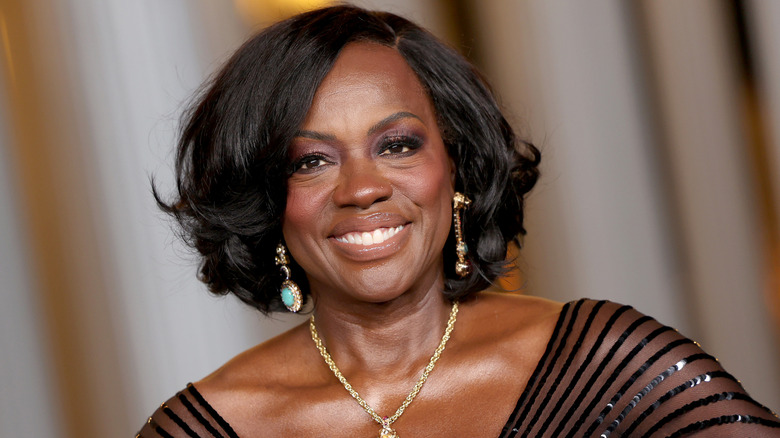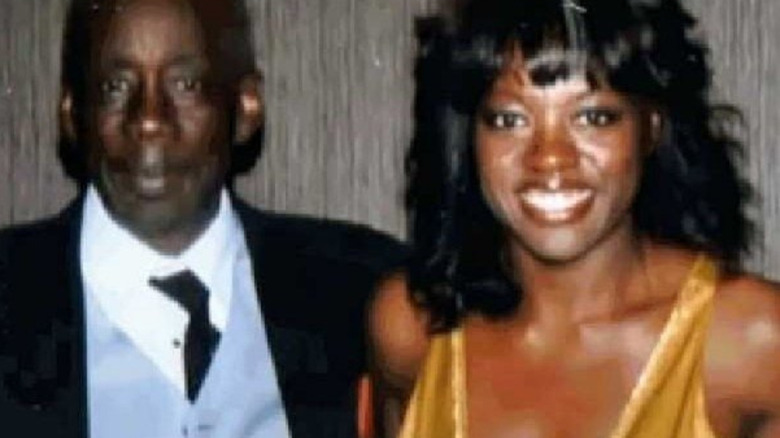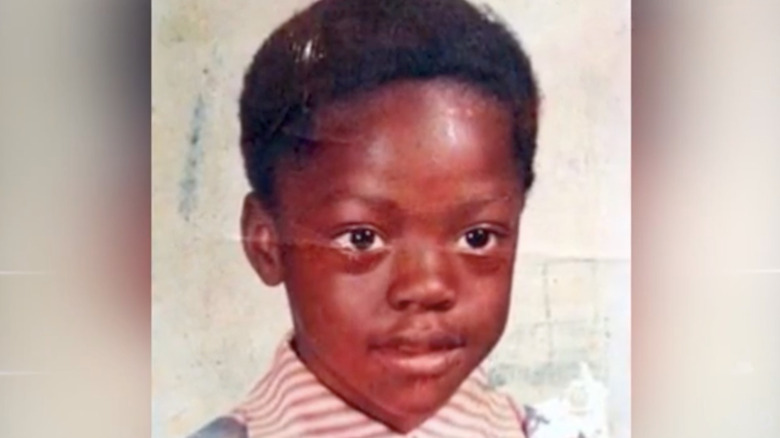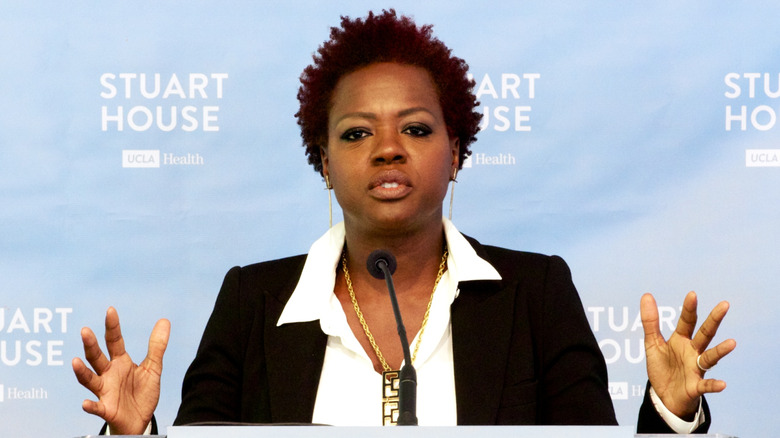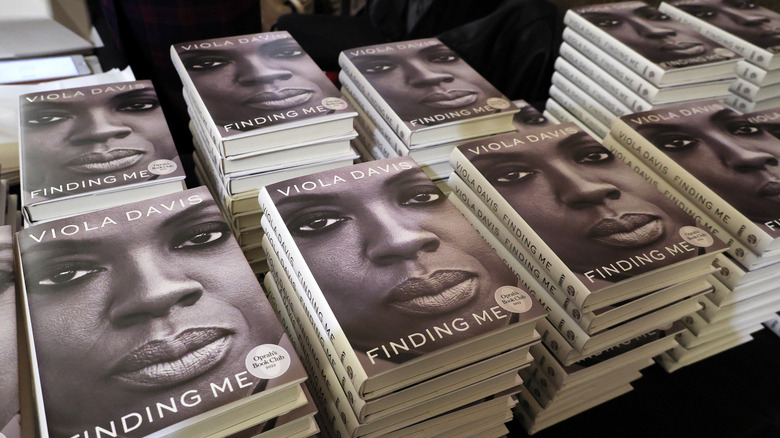The Most Tragic Details About Viola Davis' Childhood
Acclaimed actor Viola Davis is one of the most popular and beloved stars of her generation. A veteran of both stage and screen, Davis is perhaps best known for the role of Annalise Keating in the ABC drama "How to Get Away with Murder." With a career that's spanned over 25 years, Davis is an accomplished star, and as of 2021, became the most nominated Black woman in Academy Award history. But long before she shared the screen with Hollywood heavyweights such as Denzel Washington, Davis endured a very hard life.
The actor had a heartbreaking and tragic upbringing. That upbringing took place in Central Falls, Rhode Island, where she and her family lived in poverty. She shared details of that life during an event for Hunger Is, a charity that honored her in 2014. "I was one of the 17 million kids in this country who didn't know where the next meal was coming from, and I did everything to get food," she said, via Us Weekly. But poverty wasn't the only issue Davis faced growing up.
Viola Davis' father was physically abusive
Viola Davis struggled with poverty as a child, and has described scenarios of actually dumpster diving to find food. While she has acknowledged it was a harsh way to live, she also believed that her experience, much like those of other hungry kids in America, should be shared. But adding to the problem was the fact that her alcoholic father was physically abusive.
Davis appeared on the "Making Space with Hoda Kotb" podcast in 2022 to discuss her book, "Finding Me: A Memoir," which detailed the abuse she witnessed as a child. "I keep remembering these moments of violence that even happened at night in the middle of the street," she recalled. "And not one window opened. No one came out to help."
Davis also said that while she was scared for anyone to find out what was happening, she later wondered how no one knew. The trauma was so bad, that Davis used a technique to deal with what she was going through. That technique happened in the bathroom, where she would try to shut down, and focus on one part of her body. "After a certain amount of time," Davis remarked, "I literally would leave my body and I'd go up to the ceiling, I'd turn around, and I would look at myself." She credited that process for helping her cope with her situation.
Viola Davis dealt with racist bullying
The problems Viola Davis faced as a child growing up in Central Falls, Rhode Island, came from outside of the home as well. Davis was bullied by other kids, and often chased by boys who threw rocks at her and used racial slurs against her. "Was I actually running for my life? Would they actually have killed me? I don't know about that, but that's what it felt like," she explained (via Today).
Davis also described being physically attacked by a boy because she'd called him black. That experience, among others like it, left Davis feeling worthless because of the color of her skin. For Davis, that moment represented more of how the world actually saw her, versus how she should've been seen.
Davis did admit that as a child, she couldn't understand what was happening, so she was unable to truly process her circumstances. "And so it felt like I was running for my life," she commented, "and I didn't have any arms to run into. So I was just running."
Viola Davis was sexually abused
The incredible trauma Viola Davis endured as a child also included sexual abuse. She was honored at the Rape Foundation's annual event in 2020, where she talked about that abuse and how it affected her. According to Viola (via Essence), sexual abuse against children was a common occurrence in Davis' neighborhood, and she herself was abused as early as age 7.
Davis also mentioned that her sister was sexually abused at age 8, and the abuse took place in a corner store near their home. When confronted about what happened, the store owner said only that the man responsible did the same to other girls too. Though the police did get involved, the assaulter was only charged a $10 fine per month for the assaults.
Davis went on to describe the main difference between a sexual abuser and their victim. "The only person who rapes is the rapist. The person who is left behind has to pay over, and over, and over again." At the time of her speech, Davis said that in the years following, her abused sister had become a prostitute and drug addict.
The impact of Viola Davis' childhood lasted into her adult years
While Viola Davis managed to overcome her tragic childhood, and eventually found massive fame and financial success in Hollywood, she was always affected by what happened to her. Her own worldview, including how she saw herself, played a constant role in shaping how she felt about her place in the industry.
Davis told Vanity Fair in May of 2022 that finding her voice had been difficult, as she never thought she deserved to have one as a child. She said that with her darker skin tone came the realization that it was connected to slavery, and that speaking up meant losing everything. "Somewhere in my cellular memory was still that feeling," she admitted, "that I do not have the right to speak up about how I'm being treated, that somehow I deserve it." Davis believed that roles weren't as easily accessible for her as they were for other actors, and much of that she attributed to racism in Hollywood.
Despite her struggles, Davis achieved success in every form of entertainment she'd entered. She was one of only 21 people to have won a competitive Emmy, Grammy, Oscar, and Tony award in her career. Many of her life experiences were chronicled in her 2022 book, "Finding Me: A Memoir." The book became a #1 New York Times Bestseller, and won the 2023 Grammy for best audiobook (via The Hollywood Reporter), cementing her iconic EGOT status.
